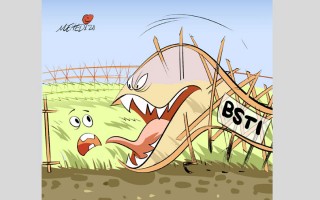73 UNEATABLE FOOD ITEMS BSTI destroys evidence, frames innocents: court
The Bangladesh Standards and Testing Institution destroyed all the evidence relating to the prosecution of 61 companies accused of marketing 73 uneatable packaged food items last year.
A Dhaka Court dealing with food standards and adulteration made the revelation on Monday.
The court also said that the BSTI intentionally provided false information to the government prosecutor to mislead the trials against the companies and deliberately framed innocent individuals to let real culprits go.
The court of special metropolitan magistrate Mehedi Pavel Sweet is holding the trials of 73 cases filed against the 61 companies between May and June last year after the BSTI found their products not fit for consumption.
The Bangladesh Food Safety Authority filed the cases as the BSTI’s reluctance in prosecuting the sub-standard-food producers sparked public outrage and prompted the High Court to intervene.
‘I did not intend to interfere with how the BSTI worked but I could not help it,’ said judge Mehedi Pavel as he heard the BSTI’s standards wing director Ishaq Ali’s explanation of why he ignored the court’s two summons to appear before it.
The court had summoned the BSTI director to explain a number of matters relating to the prosecution of the companies, at least two dozens of which enjoyed monopoly.
The prosecutor, Mohammad Kamrul Hasan, informed the court that the BSTI destroyed all samples that had been tested at its laboratories last year and that he did not have any evidence in favour of his cases against the companies.
‘We destroy samples in 72 hours of tests because perishable items cannot be preserved for long,’ Ishaq told the court.
The court wondered how someone could be prosecuted without having evidence.
‘You destroy the evidence when you are predetermined that you will not prosecute anyone,’ observed the judge.
The court said that such a mind-set of the BSTI allows businessmen to go on committing crimes like marketing of uneatable foods causing irreversible damages to consumers’ health.
‘Be careful about what you say before the court. The court speaks based on evidence,’ Mehedi Pavel told Ishaq.
The court said that it found out that innocent persons were framed in cases filed over the marketing of 73 uneatable food items by the BSTI while the real culprits were let go.
The court referred to a number of instances.
The BFSA filed the cases based on information provided by the BSTI for it certifies businesses and in this particular case collected all samples and ran tests on them.
The address that the BSTI provided for the prosecution of Rajshahi-based Amirul Traders for producing sub-standard chilli powder was actually the address of a grocery owner from where the sample had been collected.
The court was surprised when the grocery owner, Rafiq, turned up before it to say that he never owned a company that produced packaged chilli powder, adding that he was rather a poor shopkeeper.
Court documents showed that Amirul Traders had confessed to their involvement in producing sub-standard chilli powder in a letter and promised to be careful in future.
The BSTI had several exchanges of correspondence with Amirul Traders but gave the name of the grocery owner when the time came to file case against it.
Another Rajshahi-based grocer, Abbas Ali, was accused of marketing the Dolfin brand of chilli powder.
The poor grocer had to travel all the way from Rajshahi to tell the Dhaka court that he was just a victim of a corrupt system for he never was an industrialist.
At least six other instances are there in which the BSTI has furnished wrong information about the companies marketing uneatable foods.
‘It feels bad when innocents have to appear before court,’ said the judge.
BSTI director Ishaq said that they were aware of some of the mistakes and took initiatives to clear innocents of false charges.
‘The court does not need your instruction to clear innocent people of false charges,’ said the judge.
‘Tell me what action you took against the officer responsible for framing innocents in false charges and letting real culprits go,’ the court said.
Ishaq fell silent.
Ishaq was known to the court for ignoring its summon even before the trial against the 73 companies began.
In October, 2018, the court had asked Ishaq to appear before it to verify a claim by GlaxoSmithKline over misleading advertisement of Horlicks.
The companies that faced trial over producing or marketing uneatable food items included famous brands like Pran, Sqaure, Hashem and Quasem Food Products.
The companies sold 73 such food items, including ghee, coriander powder, cumin powder, turmeric powder, laccha semai, butter oil, and iodised salt.
Most of the companies returned to the market with their products in a week or so after facing ban with fresh standards certifications from the BSTI.
‘People ask questions about how all these 73 companies have improved the qualities of their products so fast,’ said the judge.
‘Did they retract all their sub-standard products from the market in such a short time? Who have an answer to that?’ the court wondered.
The court on Monday heard the case filed against Quasem Food Products for marketing sub-standard potato chips. The court fixed February 20 for hearing the case next.
News Courtesy: www.newagebd.net











